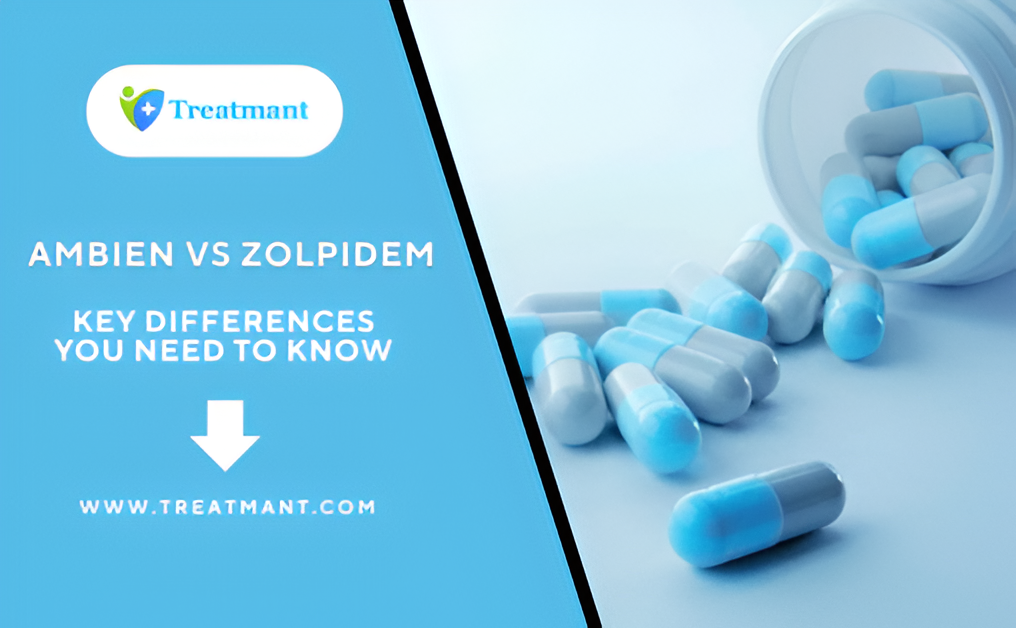
Ambien vs Zolpidem: Key Differences You Need to Know
When it comes to sleep aids, two names often come up in conversations among patients and healthcare providers: Ambien and Zolpidem. Both are commonly prescribed for insomnia, yet many people are left wondering, “is Ambien better than Zolpidem?” or “is Ambien and Zolpidem tartrate the same?” In this article, we’ll break down everything you need to know in a friendly, easy-to-understand tone. By the end, you’ll be well-informed to discuss your options with your healthcare provider.
Understanding Ambien and Zolpidem
Before diving into comparisons, it’s important to understand what each medication is. Ambien, known generically as zolpidem, is a prescription sleep aid classified as a sedative-hypnotic. It works by enhancing the activity of GABA, a neurotransmitter that slows down brain activity, helping you fall asleep faster.
On the other hand, Zolpidem is the generic version of Ambien. Although they contain the same active ingredient, the brand name Ambien is often prescribed due to its reputation, extended-release options, and doctor familiarity. This raises the common question: is Ambien and Zolpidem tartrate the same? In terms of chemical composition, yes. The differences often lie in formulations, pricing, and availability.
How Ambien vs Zolpidem Works
Both Ambien and Zolpidem work similarly by affecting the central nervous system. They help reduce the time it takes to fall asleep and may also improve sleep duration. However, subtle differences exist between the immediate-release and extended-release versions.
Ambien offers both immediate-release (for falling asleep) and extended-release (for staying asleep) versions. Zolpidem, in its generic form, may also be available as immediate-release or sublingual tablets. Understanding these differences helps determine which option is best for your specific sleep needs.
Dosage and Administration
Proper dosage is crucial when considering Ambien vs Zolpidem. For adults, the usual starting dose of Ambien is 5-10 mg for immediate-release tablets, taken right before bedtime. Extended-release Ambien may require 6.25-12.5 mg.
Generic Zolpidem follows similar dosage guidelines. Doctors often start patients on the lowest effective dose to minimize side effects. If you’ve wondered “is Ambien better than Zolpidem?”, dosage flexibility and formulation variety may influence your answer, as some patients respond differently to brand vs generic.
Speed of Action and Effectiveness
One of the main concerns for sleep aid users is how quickly a medication works. Both Ambien and Zolpidem typically take effect within 15-30 minutes, making them suitable for people who struggle with falling asleep quickly.
Some studies suggest that brand-name Ambien may offer slightly more predictable pharmacokinetics than generic Zolpidem, but the differences are generally minimal. Ultimately, individual response plays a large role, which is why doctors may ask about your previous experiences with sleep aids.
Side Effects Comparison
When comparing Ambien vs Zolpidem, it’s essential to consider side effects. Common side effects include dizziness, drowsiness, headache, and sometimes mild gastrointestinal issues.
Rare but serious side effects can occur, including memory lapses, sleepwalking, or unusual behavior during sleep. Knowing is Ambien and Zolpidem tartrate the same can help patients understand that side effects are linked to the active ingredient, not the brand itself. Your healthcare provider can guide you on minimizing these risks.
Safety Precautions
Both medications should be used with caution, especially in older adults or those with liver problems, sleep apnea, or a history of substance abuse. Avoid alcohol while taking Ambien or Zolpidem, as it can enhance sedative effects and increase the risk of accidents.
Pregnant or breastfeeding women should consult their doctor, as both medications may carry risks to the baby. Knowing is Ambien better than Zolpidem in terms of safety depends on your health profile, not just the medication brand.
Cost and Accessibility
Brand-name Ambien is typically more expensive than generic Zolpidem, which may influence a patient’s choice. Many insurance plans cover generic Zolpidem more readily, making it a more affordable option.
Some patients prefer Ambien due to familiarity and trust, while others prioritize cost-effectiveness. Understanding your priorities can help answer questions like “is Ambien and Zolpidem tartrate the same”, particularly if affordability is a factor.
Choosing Between Ambien and Zolpidem
The choice between Ambien vs Zolpidem often comes down to personal preference, response to the medication, and doctor recommendations. Some patients respond better to the brand-name Ambien, while others find generic Zolpidem equally effective.
Other factors include dosage options, cost, and potential insurance coverage. By discussing your sleep patterns, health history, and lifestyle with your healthcare provider, you can make an informed decision tailored to your needs.
Tips for Using Sleep Aids Effectively
Whether you choose Ambien or Zolpidem, proper usage enhances effectiveness and safety:
- Take the medication immediately before bedtime.
- Ensure you have a full 7-8 hours available for sleep.
- Avoid alcohol, driving, or operating machinery after taking the medication.
- Discuss any other medications you’re taking to prevent interactions.
These strategies help maximize the benefits of Ambien vs Zolpidem and minimize potential side effects.
Frequently Asked Questions (FAQs)
Q1: Is Ambien better than Zolpidem?
A: Both are effective for insomnia. Ambien may offer more formulation options, but generic Zolpidem is equally effective for most patients.
Q2: Is Ambien and Zolpidem tartrate the same?
A: Yes, chemically they are the same. Differences lie in branding, pricing, and formulation options.
Q3: Can I take Ambien or Zolpidem long-term?
A: These medications are usually prescribed for short-term use. Long-term use may lead to dependency or tolerance. Consult your doctor for guidance.
Q4: Are there any natural alternatives to Ambien and Zolpidem?
A: Yes, options include melatonin, valerian root, and cognitive behavioral therapy for insomnia (CBT-I). Always discuss alternatives with your healthcare provider.

Leave a Reply